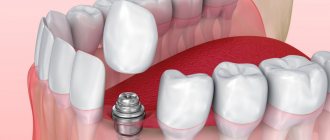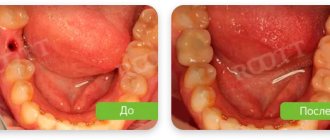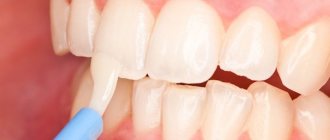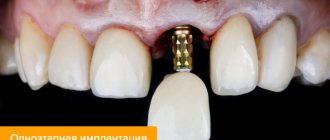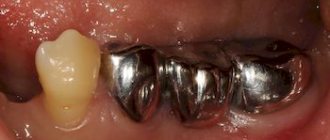Professional prosthetics makes it possible to restore one or more elements of the dentition. Implantation using high-quality biomaterials allows you to restore the natural anatomy of the dentofacial apparatus and promotes uniform chewing load on the jaw structure. A high-quality crown on an implant is visually no different from natural dental units and has an impeccable and aesthetic appearance.
Orthopedic structures prevent bone tissue atrophy. As a result, the bone does not decrease in volume or become deformed. Timely prosthetics helps prevent changes in facial asymmetry and the formation of various bite defects. Throughout the entire service life of the installed implants, the naturalness of chewing sensations is maintained. Neighboring elements of the dental system do not suffer, taste sensations do not change, and oral hygiene is easy to maintain.
Types of crowns for implants
What kind of crowns are placed on implants? Like regular dentures, implant-supported dental crowns come in a variety of types depending on the material. Today, the most popular materials used in the manufacture of crowns on implants are ceramics and metal-ceramics. Their main difference, as the name suggests, is the presence or absence of a metal frame in the design. Recently, it has become popular, for example, to install zirconium crowns on implants - all-zirconium or ceramic restoration structures made on a zirconium frame.
- Ceramic
Dentures made of ceramics are usually recommended to be installed in the area of the front teeth. Such structures are highly biocompatible, which means they do not have any negative effects on the soft tissues of the oral cavity. Plus, they look exactly like natural teeth. Ceramic crowns are more transparent, so in this case an abutment will be made of ceramic or zirconium. - Zirconium
Implant Crowns made from this modern material are most in demand by specialists today. The secret of their popularity is simple: they combine good aesthetic qualities and high strength. - Metal-ceramic
Metal-ceramic is perhaps the most common material used for the manufacture of dentures. Metal-ceramic crowns on implants for chewing teeth are inexpensive and reliable. They usually require a metal abutment.
Implantation and smoking
It is mandatory to quit smoking in the first 3-4 days after surgery to install implants (or before removing sutures, if they were applied). After the osseointegration process is completed, smoking is allowed, but you need to remember that the tars and carcinogens contained in cigarettes lead to increased accumulation of plaque, burns of the mucous membrane, and disruption of metabolic processes between the cells of all periodontal tissues. As a result, the risk of developing inflammatory processes and implant rejection increases. There is also a change in shade and rapid wear of the denture.
Therefore, we recommend giving up this bad habit completely. If this does not work, then you need to at least minimize the number of cigarettes consumed per day or switch to electronic analogues with a reduced content of harmful substances.
After smoking, be sure to perform oral hygiene - brush your teeth with toothpaste and a brush, rinse your mouth with mouthwash. This is a mandatory procedure that will minimize harmful effects.
If you smoke, then a complex of oral hygiene with a dental hygienist, together with a preventive examination of the condition of periodontal tissues, implants and dentures after complete implantation, must be completed more often than usual - at least 2 times. Talk to your hygienist about how best to enhance your hygiene.
What is the best crown to put on an implant?
The answer to this question depends on the area being implanted and your budget. If we are talking about chewing teeth and the patient does not want to overpay, then the doctor will most likely recommend metal ceramics. Zirconium crowns for chewing teeth will undoubtedly be the best option. However, it is also more expensive. If prosthetics takes place in the so-called smile zone, then it is better to place a crown on a ceramic implant. She will look not only beautiful, but also absolutely natural.
Pregnancy with dental implants
If you had dental implantation at a young age, then you can safely prepare for pregnancy - the presence of an implant is not a contraindication (provided that the structure has already fully fused with the bone tissue). The only thing you need to pay attention to is the condition of periodontal tissues during pregnancy, since hormonal changes occur during this period and gingivitis and periodontitis often occur, i.e. inflammation of the gum tissue.
During the entire period of pregnancy, it is necessary to see your dentist and pay increased attention to hygiene (you also need to see a therapist or hygienist more often - up to 3-4 times a year). It is also advisable to take vitamin complexes (calcium, vitamin D), unless, of course, there are contraindications. But only under the strict supervision of attending physicians (dentist and gynecologist).
Installing a crown on an implant
Installing a crown on an implant involves putting a specially machined crown on an abutment that connects it to the implant - an artificial root, while crowns for traditional prosthetics are made from casts of ground natural teeth and installed on previously prepared teeth.
How long does it take to place crowns on implants? It all depends on the clinical picture. If immediately after installation the implant is stable and there are no indications for delayed prosthetics, then the implantologist places a crown on the implant immediately. In the area of the chewing teeth, which are not visible when smiling, most likely, a crown will be placed several months after the final implantation.
Installation steps
- After installation, an abutment is placed on the dental implant. Essentially, it replaces the tooth stump that is left after preparing the tooth before installing a conventional crown.
- When the abutment is installed, the doctor takes an impression to subsequently make a permanent crown for the implant.
- The final stage of installing a dental crown on an implant is fixing the prosthesis to the abutment.
What to choose - to summarize
| Implant | Crown | |
| Traumatic installation | high | short |
| Speed of tooth restoration | 2-6 months | from 2 days |
| Reliability of fixation | very high | above average |
| Need for replacement | No | Yes |
| Possibilities | any missing tooth | if there is no fracture and inflammation at the root |
| Life time | for life | 5-15 years |
| Price | high | depends on the need for pre-treatment |
Implants are reliable and durable. They imitate the structure of an incisor or molar. The lifetime service life of the titanium rod can be guaranteed. But surgical intervention is a necessary measure; no implant can replace a natural root. The dentist’s task is to preserve even part of the element of the dental system. A well-treated tooth and a correctly installed orthopedic structure create conditions for long service life and high aesthetics.
On the other hand, a root without pulp can no longer be called complete. Without nutrition, tissue breaks down, leading to organ loss. Then, in order to pay twice, it is better to install the implant immediately.
The doctor will tell you what is best to choose after diagnosis and examination.
Fixation of the crown on the implant: screw and cement
There are two ways in which you can place a crown on an implant - screw and cement. Screw-retained implant crowns involve drilling a hole in a prefabricated crown, which is later sealed. A screw is inserted through it, passes through the crown and is screwed into the abutment. All this happens outside the patient's mouth. When the crown and abutment are securely connected, the latter is secured in a special hole in the implant. Cement fixation of a crown on an implant is similar to the installation of a conventional crown: it is glued to the abutment using special cement - a composite material, while the abutment is already securely fixed in the implant, and the installation procedure takes place directly in the patient’s oral cavity.
All of the above applies to permanent crowns - those that are installed some time after implantation, when the first period of engraftment passes. But in most cases, implantation involves the possibility of instantly loading the implant with a temporary crown.
Rules of nutrition after implantation
Your diet has long become complete - the period has passed when quite strict restrictions were imposed in terms of the hardness of foods and the temperature of dishes. However, even now, after the implants have completely implanted, you will still have to give up a number of products.
- Chew food thoroughly, using both sides - all installed implants should receive an even load. If there is discomfort and you notice that you are chewing food on only one side, consult a doctor immediately.
- introduce a maximum of healthy foods into your diet - food should be rich in various groups of vitamins,
- Do not bite off hard vegetables and fruits - they must first be cut into small pieces. It is better to grate carrots before eating, because... it's too hard to chew
- It is better to exclude shish kebab and hard fried meat - give priority to boiled, stewed meat, and cutlets. The veins contained in meat products get clogged under the prosthesis - it is very difficult to remove them,
- nuts are prohibited - the problem is not even that they are too hard. Like meat, they get stuck under the prosthesis and are very difficult to remove from under it,
- but at the same time, the food should not be soft - it is important to give a reasonable load to both prostheses and implants,
- it is important to drink as much water as possible, chilled herbal or fruit teas,
- exclude (or at least minimize) wine, beets, black tea and coffee, which lead to staining and permanent discoloration of the denture,
- also exclude foods and drinks that contain acids, bites - they can lead to irritation and inflammation of the mucous membranes,
- It is allowed to drink hot drinks and eat cold ice cream, but you cannot combine them to avoid sudden temperature changes.
Use your teeth only for their intended purpose, namely for chewing food! They cannot be used to open bottles, remove corks, or crack nuts. Although they are artificial, they will easily break under increased load.
Why are temporary crowns needed for implants?
Temporary crowns on implants are installed primarily for aesthetic reasons, so that the patient does not walk around with a “hole” in the mouth for the entire healing period. This is especially true for prosthetics in the smile area. In addition, the temporary crown, although not always fully functional, is still involved in speech and chewing. It is distinguished from a permanent crown by the material of production - light plastic, and therefore also by cost and weight. These parameters are important, since spending a lot of money on a temporary crown, which is not needed for a long period of time, is inappropriate, and loading a newly installed implant with a crown of full weight is dangerous. At the same time, externally, temporary crowns are practically indistinguishable from permanent ones, and therefore from natural teeth, their color is matched to the shade of the enamel of the surrounding teeth, all this allows you to hide the prosthetic process from prying eyes.
Implantation and alcohol
Remember that the effects of alcohol are very harmful to the entire body. Therefore, we insist that the consumption of drinks that contain even a negligible amount of alcohol must be limited and kept to a minimum.
- While intoxicated, you may perform inappropriate actions. For example, getting into a fight, which will lead not only to damage to the prostheses, but also to displacement of the installed implants,
- hygiene is difficult or impossible - when a person is heavily intoxicated, he cannot control his actions. If you carry out hygiene in this state, you can damage the gums around the implants, which can lead to the development of inflammation and subsequent rejection of the structures,
- appetite increases - you can damage the implants by eating prohibited, too hard food,
- your immunity will stop working at full strength,
- alcohol has a negative effect on the mucous membranes, especially if they are inflamed (you may not know about the presence of a problem if you have not had a preventive examination with a doctor for a long time),
- you forget that you need to visit a doctor: such situations arise in cases where the patient drinks alcoholic beverages for a long period of time,
- you may lose your warranty.
Drinking alcohol should not become an obstacle to living a full life and maintaining the results of expensive treatment!
Which is better, a crown or an implant?
When asking a similar question, patients most often mean the installation of dentures based on their own teeth and implantation. What is the difference between a regular crown and an implant? In order to install a conventional bridge, it is necessary to grind down the healthy teeth adjacent to the defect, which will begin to decay over time and the bridge will have to be lengthened. This cannot happen with an implant. Its installation does not affect the “neighbors” in any way, and its service life is not limited. Only the crown will have to be changed. The service life of crowns on implants is about 10 - 12 years, and in many cases reaches 15 years, while with traditional prosthetics, the crown must be changed every 5 - 7 years, grinding the teeth in a new way.
General rules: what is allowed and what is prohibited
- air travel – fly and travel without restrictions, explore the world and taste new dishes (but with minor restrictions - more about them in the “food” section),
- physical activity – play sports and maintain your health. But exclude lifting excessive weights (in particular, when doing powerlifting) and sports activities that are associated with injuries to the maxillofacial area,
- visit swimming pools without restrictions, but use baths and saunas with caution (severe overheating is not recommended). The temperature of the steam room should be average, the length of stay should be minimal (no longer than 10 minutes),
- keep your body healthy. If you have been diagnosed with diabetes mellitus or diseases of the cardiovascular system, remember that if the condition worsens, metabolic disorders in periodontal tissues may occur, which carries a risk of rejection of structures. Be sure to take medications prescribed by your specialist and monitor your blood pressure and blood sugar.
Visit your doctor at least once a year for a preventive examination, and in case of unsatisfactory self-hygiene and doctor’s indications, more often - 2-4 times a year for professional oral hygiene. This will allow, firstly, to maintain healthy gums and achieve high-quality cleansing of pathogenic microflora, and secondly, to eliminate possible complications in the early stages and promptly eliminate them.
Important questions about dental implants
Will I get natural and beautiful teeth? It seems to me that the crowns will be noticeable in any case.
Implants are artificial roots for crowns, dentures and other orthopedic structures.
Thanks to them, the teeth feel like real ones, receive adequate physical activity, and do not move. Installation of a bridge does not require damage to adjacent healthy teeth. As for the aesthetic side of the issue, not a single crown or prosthesis is finally attached before the patient accepts its appearance. We offer each client an individual solution, taking into account requirements and wishes, trying to choose the ideal shape and color scheme. The dentist tries on the finished crown or prosthesis and only after the patient’s consent securely attaches it to the implant.
How many doctor visits are required?
It all depends on the individual factors of the clinical case. As a rule, one consultation is enough to decide on the type of operation and its volume. Then you need to take tests and accurately determine the date of installation of the implant, the type of anesthesia and many other nuances. The actual surgical intervention is performed once, very rarely twice. Then after a few days the situation is controlled, and after 10 days the stitches are removed. The healing period does not require visits to the dentist, but only if it progresses adequately.
Can I exercise after getting implants?
In general, it is not prohibited to move without overload, but you need to wait at least 2-3 weeks after the operation. It is recommended to discuss the issue with your dentist in advance to determine the acceptable type of sport and optimal loads.
What care is required for crowns installed on implants?
Care for artificial teeth in the same way as before for real teeth. No additional tricks are required. Choose a suitable toothbrush and toothpaste, clean the crevices between the teeth and the junctions with the gums. Use dental floss to remove food debris between your teeth. Do not forget to visit the dentist 1-2 times a year for preventive purposes.
Can installed implants cause an allergic reaction?
There are no known cases of allergic reactions to titanium structures in medicine. This material has long been used in traumatology, dentistry and other industries, as it is not rejected by the body. Titanium implants are additionally covered with protective layers and perfectly imitate a real tooth root. Therefore, the occurrence of allergies is impossible.
Will I have any pain after surgery?
The presence and severity of pain depends on the individual characteristics of the body. Some patients do not require analgesics the very next day after surgery. However, pain will definitely occur if you refuse to take medications prescribed by your doctor according to the regimen. You can find a list of them and admission rules in the NB-After card. The necessary medications are in a special white bag.
Can implantation be performed on minors? What age is considered optimal?
Implantation is permitted and is carried out only after the formation of the osteoarticular apparatus of the jaw is completed. As a rule, this occurs by the age of 18, but in individual cases it is delayed for longer periods. Therefore, implantation is definitely not performed on minors. And the possibility of its implementation in older patients is determined using radiographic examination.
When may it be necessary to restore alveolar ridge bone tissue?
In 90% of cases, patients require bone grafting because the jawbone is thinned and is not suitable for implantation. There are plenty of reasons for this: long-term absence of a tooth, low loads on the bone, inflammatory processes, prolonged wearing of any dentures (only implants stop the process of bone resorption).
There is no need to be afraid of bone grafting, because modern technologies have eliminated any risks associated with it. In addition, the restored bone volume guarantees adequate fixation of the implant.
How long will the implant last?
A correctly installed high-quality implant is an ideal imitation of a tooth root. It withstands chewing loads, does not become loose, and does not become less reliable. Implants do not have to be replaced throughout your life, so they are the optimal solution for restoring teeth. It is better to place an implant once than to constantly change removable dentures.
Will I have to go without teeth while the treatment and healing process takes place?
Of course not. If you wore a removable denture before getting an implant, you can put it back almost immediately after surgery. In other cases, the doctor individually selects a temporary prosthesis. Sometimes removable temporary structures are installed for long-term wear. They are attached directly to the implant.
I had surgery and was sent home. What should you do right away?
The first few hours after installation of the implant, you should cool the cheek externally to prevent or at least reduce the severity of swelling. To do this, prepare ice cubes or cold compresses. Recommendations for the postoperative period are written down in the NB-After card. Read it carefully and follow the instructions exactly.
What are dental crowns made of?
Most patients get structures made of metals coated with ceramics to match the color of the teeth. Such structures are strong, reliable and indistinguishable from real teeth. Only when exposed to direct rays of light will the metal inside be visible. Solid ceramics are also used for crowns without the use of metals. It gives the perfect aesthetic appearance to your smile. It is used for both individual crowns and bridges.
What to expect from a consultation?
An initial consultation with a dentist is not something super special. The doctor will assess and discuss your situation, conduct an examination of the oral cavity, suggest the best ways to solve the problem, and prescribe a series of studies. Come to your consultation with old dental photographs, if available. Bring all medical documentation. Don't forget to tell your doctor about your chronic diseases and list the medications you take regularly. Be sure to report any allergies to medications. Don’t be afraid to ask provocative and simply clarifying questions, don’t be afraid to demand certificates and licenses.
I want to get implants, but in the future I plan to lighten my teeth and improve their aesthetic appearance. What should I do?
Feel free to contact our specialists with this problem. Yes, implants are matched to the color of the patient’s tooth enamel. However, our doctors can lighten the teeth using special plates called veneers. They will not only improve the color of your teeth, but also correct cosmetic defects in their shape.
Should smokers get implants?
Previously, smokers were dissuaded from undergoing implantation, since it cost a lot of money, and the result quickly returned to zero due to constant smoking. Modern technologies and materials reduce the risk for smokers and the long-term service life of implants and crowns on them is reduced only with insufficient oral hygiene. If you are concerned about the appropriateness of implantation, discuss this issue with your dental hygienist. He will select individual procedures.
How and when are crowns placed on implants?
In modern conditions, permanent crowns are placed after implants have healed, which occurs within 3-4 months. Duration varies slightly. The process itself consists of: removing temporary crowns, removing a sealed plug, making an impression and shaping the gums using special caps. The dental laboratory creates an individual crown for each patient. Then the fitting takes place and only after this the crown is securely fixed. It happens that you have to adjust the size and shape of the crowns several times so that they do not differ in any way from real teeth.
Are implants placed after tooth extraction?
Certainly. This treatment option is considered one of the most optimal, since the bone tissue does not have time to dissolve. With this type of implantation, bone grafting is often not required. The titanium structure is fixed into the socket from which the real tooth was removed. Further engraftment and further fixation of the crowns proceed as standard.
Do not confuse implantation after tooth extraction and implantation with immediate loading.
What is immediate loading implantation?
In rare cases, when the patient does not undergo bone grafting or, according to individual indications, the operation is performed with immediate loads. That is, a high-quality permanent crown is fixed to the implant immediately after its installation. There is no need to wait until engraftment occurs.
Do I need to remove removable dentures attached to implants before going to bed?
No need. Any crowns or complete removable dentures are very securely fixed to implants, so there is no need to remove them at night. People usually remove their dentures before going to bed to prevent them from shifting and blocking their airways. Dentists always warn patients about this risk. However, technologies for fixing prostheses on implants have eliminated this problem. Therefore, you can sleep peacefully in dentures without risk to health and safety of structures.
How do implants differ from each other in terms of quality?
Implants come in different types and types, depending on the method of implantation. However, the most optimal, safe and predictable option is the classic installation of titanium structures. In appearance, the patient will not be able to distinguish one implant from another, since they are all similar to an ordinary screw. But professionals know that there is a difference in quality.
Modern Nobel Biocare implants are manufactured using a special coating that accelerates bone growth and implantation of the structure. Our clinic only uses implants with a coating that is invisible to the human eye. We have been using Nobel Biocare implants with TI-Unite surface for over a decade and have never been disappointed with their quality.
Is implantation performed under general anesthesia? What kind of anesthesia is used for dental implantation?
No, general anesthesia is not performed. There is no pain or discomfort at all when implantation is performed under local anesthesia. The patient may feel slight vibration or pressure, but no pain. For those people who are terrified of surgical interventions and want to undergo general anesthesia, it is recommended to consult with the treating dentist. He will assess the possible risks and help the patient make the right decision.
I want to change the prosthesis, which is fixed to the implant. Can this be done?
Yes. Whenever. Any dentures or crowns that are attached to implants can be replaced or updated. Moreover, a single implant can be converted into a support for a bridge at any time. The designs used in our clinic are compatible with various individual orthopedic solutions.
Are there diseases for which implantation is prohibited?
There are no specific diseases that would become an obstacle to implantation. However, there is such a thing as the general condition of the patient. If you have serious chronic diseases and they are decompensated, there is organ failure, then no one will perform an operation on you. Only after the condition has stabilized.
When contacting an implantologist to install titanium structures, be sure to inform him about the presence of any pathologies in the body. The doctor will be able to prescribe additional medications and eliminate possible risks. Do not hide the characteristics of your body from the dentist, because this will only increase the chance of an unfavorable outcome of treatment.
Is implantation performed in patients with diabetes?
Yes, it is carried out. However, only after specially corrective treatment aimed at achieving compensation for the patient’s general condition. A similar adjustment can be made in our clinic. Patients with decompensated diabetes mellitus, high sugar levels, and severe complications first normalize their condition and only then can count on implantation. Such precautions are due to the fact that in patients with high sugar levels, wounds heal poorly and the risk of infection is increased.
Can the implant become inflamed and what should I do?
Yes, indeed, in the absence of regular oral hygiene or when immunity is reduced, an inflammatory process can occur. If you consult a dentist in time, then there will be no problems with his treatment. And with regular preventative visits to the doctor, proper brushing of teeth and a generally healthy lifestyle, there is no need to worry about such a problem.
What complications are there?
Previously, complications did occur and not as rarely as we would like. But modern technologies for installing implants and planning surgery make it possible to eliminate all possible risks. The only problem that periodically arises is insufficient fixation of the implant in thinned bone tissue. But the complication, as a rule, is provoked by patients’ refusal to undergo bone grafting. In such cases, the implant is moved under local anesthesia.
I wear a removable denture for the entire jaw, which is constantly moving. I want to install implants, but attach an existing prosthesis to them. Can this be done?
For reliable fastening of a complete removable denture, four titanium structures are sufficient. Your denture can be placed on implants if it is comfortable for biting and chewing and will also provide your jaw with adequate exercise. The fastenings on the implants are so strong that you can immediately forget about displacements. To evaluate the condition of your jaws, your dentures and make the right prosthetic decision, consult with our dentist.
Will I be able to feel which teeth are real and which are not?
No. Implants and modern dentures make it possible to achieve a perfect imitation of natural teeth. You won't feel any difference when you smile, bite into an apple, or chew your food. Only professional dentists can notice the differences, and sometimes only with the help of special equipment.
Are there any dietary restrictions?
No. Implants with crowns, bridges or any other structures attached to them can withstand standard chewing loads without any problems. That is, you should not open a bottle with your teeth - even a natural tooth will not withstand this. But you can eat solid foods like apples or nuts with complete peace of mind.
After surgery, is it preferable to sit or lie down?
We are all accustomed to the fact that after surgery we need to lie down for several days or at least hours. However, in dentistry the situation is the opposite. The horizontal position promotes a rush of blood and lymph to the head, which causes severe swelling and increased pain. Therefore, it is better to spend the first hours after implantation sitting. A short walk in the fresh air will also be beneficial. But don’t overwork yourself – physical activity is prohibited. And try not to bend over.
How soon can you eat and drink?
If you feel thirsty, be sure to drink water at room temperature. However, food and other drinks should be delayed until the local anesthesia wears off. The precaution is due to the fact that the patient may unintentionally damage the wound surface or burn the mucous membranes.
What to eat after surgery?
Eliminate from your diet hard, sticky, floury foods that take a long time to chew or their remains stick to the mucous membranes of the mouth. You can eat light soups, soft cutlets, mashed potatoes. Food should require a minimum of chewing movements. But no yogurt! We also exclude sweets for the first time. You need to eat such food before the stitches are removed, and then you can return to your usual diet.
They say that after installation of implants you should not drink coffee. This is true?
Coffee lovers can safely continue to drink it after implants are installed. You should avoid drinking it, as well as strong teas and highly carbonated drinks, in the first days after surgery. These drinks increase blood pressure, which can cause bleeding.
Is it allowed to chew on the side of the installed implant?
Until the stitches are removed, it is prohibited! Don't be afraid if food gets on the wound. After finishing using it, you should carefully rinse your mouth with warm water each time. However, you need to chew exclusively on the healthy side.
When can I brush my teeth?
A day after surgery, feel free to start brushing your teeth. Moreover, you must start cleaning them to prevent inflammatory processes. When cleaning, walk around the wound surface. It is recommended to use a soft brush so that accidental contact with the bristles on the wound does not damage its edges and seams. The use of irrigators and any mouthwash is prohibited. You should also avoid using an electric toothbrush for a while.
Will there be pain after the local anesthesia wears off?
Yes. The first hours and even days after surgery will help you with a regular analgesic. Take it strictly as directed. The first night after surgery, sleep on a high pillow to allow blood and lymph to flow away from your head. The intensity of the pain syndrome depends on the scope of the operation and the individual characteristics of the body. But gradually the pain will go away. Some clients do not take painkillers within 24 hours after surgery.
Is the wound highly sensitive?
No, and every day the sensitivity decreases. To avoid causing pain or irritation, do not touch the wound with your tongue or fingers. Healing is very fast.
What to do if blood flows?
In the first days after surgery, slight bleeding may persist. It is considered physiological and does not require any action on the part of the patient. Saliva may be slightly pink in color. But the bleeding quickly stops and is almost invisible to patients. If blood flows unexpectedly a few days after the operation, and before that everything was fine, you should immediately consult your doctor.
How long does it take for stitches to be removed?
The date for suture removal is determined individually by the implantologist and depends on the extent of the surgical intervention and some other factors. On average, sutures are removed after one to two weeks.
What do you do after the stitches are removed?
Nothing at first. The next stage is carried out after 5 weeks - the patient is fitted with a gum former. After this, an individual crown or bridge, or a prosthesis for the entire jaw, is made on the implants.
Will the healing abutment interfere?
It will be noticeable in the mouth, but will not cause serious discomfort. Patients usually get used to its presence within a few hours. In addition, they do not wear it for long.
Why is it worth paying attention to the connection between the crown and gums?
This area is the best place for bacteria to penetrate into the gums and even bone tissue. This is accompanied by the occurrence of serious inflammation, which, if the process is neglected and there is no correct treatment, can even lead to the loss of the titanium structure. It is especially important to thoroughly clean the joints in the first year after surgery, when the implant is actively healing.
Are irrigators necessary for proper care?
Until the wound heals and the stitches are removed - definitely not. In general, there are two sides to the coin: irrigators can clean the oral cavity well, but their excessive use can lead to damage to the gums and the penetration of bacteria into it. If you are used to using irrigators, continue, but don’t overdo it! And if you have never used them, then there is no need to start.
Can I use whitening toothpastes?
Yes, but not often. The substances it contains have a very aggressive effect on the crown, which leads to damage to its surface. Consequence: rapid discoloration, accumulation of bacteria, formation of tartar.
Can an unexpected reaction occur if I take medication regularly?
Yes. Cases of cross-reactions are known, so you should list to your dentist all the medications that you have to take on a regular basis. This is especially true for drugs that reduce immunity and blood thinners.
When can I return to work after surgery?
As a rule, you can return to work the next day. But this issue is discussed individually with the dentist. If there is significant swelling, then it is better to sit at home for a day.
How much money will you have to spend?
Our clinic uses a turnkey package implantation system. Its cost will be from 60 thousand rubles . The price of crowns and prostheses is determined individually and depends on the fixation option. In general, the average cost of crowns in Moscow is from 35 to 55 thousand rubles.
What is a batch system?
We offer a fixed price for turnkey implantation, which includes a number of necessary surgical steps. That is, the clinic does not have separate price tags for crowns, anesthesia, and so on. After assessing the clinical case and determining further tactics, the dentist names one amount that will include all stages of treatment. Price includes:
- Cost of the implant itself;
- Cost of the operation, including sterile instruments and consumables;
- Cost of bone grafting and materials for it;
- Applying and removing sutures;
- Control visits to the dentist and necessary examinations;
- The second stage, which includes anesthesia and installation of the shaper.
After this, a crown or prosthesis is selected, which are paid separately.
What is Nobel Biocare?
Nobel Biocare designs are high quality implants. During their production, starting with the supply of materials, each stage is certified and strictly controlled. The design of the implants is clearly calibrated, and their range will allow you to choose the best option even in the most difficult clinical situations. The implants have a specific TI-Unite surface, which is similar in composition to the dentin of natural teeth. This allows for faster healing and increased reliability of implant fixation in the bone.
I have bruxism. Is it possible to get implants or does it make no sense?
Can. In addition to the fact that the implants can withstand standard chewing loads, and the crowns are made of very durable materials, patients with bruxism are recommended to use special mouth guards. They will help reduce stress on your jaws, teeth and joints. Consult with our dentists how best to solve the current situation.
What care is required for dentures and implant crowns?
Care for bridges, crowns, and other dental restorations just as you would for natural teeth. Clean them twice a day, use dental floss, and periodically visit the dentist for preventive purposes. The only point: when brushing your teeth, pay special attention to the spaces between the teeth and the places where the crown comes into contact with the gum.
Is it possible to perform implantation with increased pressure?
Hypertension is a very common pathology. If your treatment regimen for the disease has been completely adjusted, and your blood pressure numbers remain in the same range, then there will be no problems.
How to care for your gums after having a retainer installed?
A short time should pass between the formation of the gums and the placement of the crown. During this period, no special care products are required. It is recommended to brush the area with the former in the same way as you would your teeth, but use a soft brush. Sometimes the doctor puts stitches that are better avoided. The shaper must be completely motionless. If you feel any changes in its location, consult a doctor immediately. Don't try to fix the situation yourself.
Is it possible to do without bone grafting?
Many patients are afraid of sinus lifting because of the imaginary complications that the Internet promises. However, modern techniques for carrying out the procedure have eliminated any risks. Deficiency of the alveolar ridge of the upper jaw occurs in almost all clients, and bone grafting is the key to reliable fixation of the implant.
Can I use an electric toothbrush after implantation?
Certainly. An electric toothbrush cleans your teeth just like a regular toothbrush. Therefore, implantation is not a contraindication for its use.
How often should you visit the dentist after implantation?
If all stages of treatment are completed successfully, then it is recommended to undergo preventive examinations of the oral cavity 2 times a year or at least 1 time a year. This allows you to identify problems at the initial stages and avoid complications.
What are the contraindications for implantation?
There are no absolute contraindications to surgery. Any problem can be solved. But implantation is postponed during pregnancy and lactation, acute inflammation in the oral cavity, and severe decompensated chronic diseases. First you need to carry out corrective treatment, and then proceed with implantation.
Are healthy teeth damaged when dental bridges are installed?
No. Fixing bridges on implants avoids grinding down healthy teeth, which is a definite plus. In addition, implant-fixed dentures and crowns help restore physiological stress to specific areas of the jaw, making healthy natural teeth last longer.
How are prostheses made and installed?
Modern technologies are closely intertwined with dentistry and have given it the following opportunities:
- instead of conventional impressions, digital scanning of the oral cavity is carried out using intraoral 3D scanners, and the data is immediately sent to a computer - to a specialized program for creating a model of the prosthesis,
- modeling a perfect smile even at the stage of preparation for implantation (for example, using the Digital Smile Design concept),
- milling of prosthetic bases on high-precision machines: allows you to create a perfectly adjacent structure - both to the abutment and to the opposite teeth when the jaws are closed.
If we consider the installation in a simplified version, then after fixing the abutments, impressions are taken, then a model is created in the laboratory - and a prosthesis is already made on its basis. Then it is tried on, and if the doctor and the patient are satisfied with everything, then the structure is permanently attached (with screws or cement).
Choosing the best crown
Let's decide which crowns are best placed on implants. A good solution in terms of price and quality are metal-ceramic ones, but in the frontal zone they can lead to “blueness” of the gums. Therefore, the best option is zirconium dioxide. Their price may seem high to some, but it is fully compensated by their service life. After all, while you are wearing a zirconium dioxide prosthesis, the metal ceramics will have to be changed at least once - this is extra money and time.
“I definitely won’t get metal-ceramics for myself anymore, because it makes my gums look very ugly. I don't want to smile. Therefore, when the old bridges became loose and I had to put in implants, I immediately told the dentist that we’d better use zirconium. Honestly, I’ve been wearing new teeth for 2.5 years now and you can’t tell them apart from real ones, and my gums are fine.”
Svetlana A., 42 years old, review from irecommend.ru

